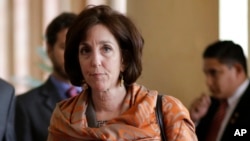President Barack Obama's recent decision to restore diplomatic relations with Cuba is moving ahead: A diplomatic mission headed by State Department official Roberta Jacobson is expected on the island nation Wednesday to negotiate the reopening of the U.S. embassy in Havana.
While the majority of Americans support Obama's call to end 50 years of diplomatic and trade embargoes on the island nation, some lawmakers continue to protest.
But State Department spokeswoman Katherine Pfaff told VOA that the conversation between the two sides is part of an important process that will advance U.S. interests on the ground.
"It will strengthen the United States’ ability to advocate for positive change on the island," Pfaff said. "By facilitating the Cuban people’s access to greater resources and information, the policy change seeks to engender greater respect for human rights and adherence to democratic principles in Cuba."
Jacobson, assistant secretary of state for Western Hemisphere affairs, is expected to discuss such technical details as embassy operations, staffing and visa processing with her Cuban counterparts. Pfaff said Jacobson also would meet with civil society, religious and independent business leaders.
A Russian intelligence ship docked at Cuba's Havana port Tuesday, one day before the high-level U.S. visit.
Citizens' support
Recent public surveys show the majority of Americans support Obama's decision to ease the diplomatic and business embargoes on the communist nation, but fully lifting the measures will depend on Congress.
A group of U.S. lawmakers was in Cuba earlier in the week to talk about possible trade opportunities between the two countries, if and when Congress votes to end the decades-long embargo.
Ted Piccone, a senior fellow at the Brookings Institution, said the talks between U.S. and Cuban diplomats show that despite the opposition by some lawmakers, normalization of relations will proceed.
"I expect steady but slow progress, knowing that the end goal, which is normalization, has already been stated, has already been accepted by the two presidents, and now it's just a matter of implementing," he said.
Piccone, who was in Havana when Obama announced his new Cuba policy, said the mood on the street there was very positive. He said many Cubans hope the change will bring new investment and a better economic future.
Property claims, other obstacles
Piccone, however, cautioned that the path to normalization would be bumpy. Obstacles include billions of dollars' worth of outstanding property claims from those who had their businesses and lands expropriated by the Cuban government after Fidel Castro took over in 1959. He said some 6,000 claims had been registered officially with the U.S. government and will need to be resolved.
There's also the question of Cuban political prisoners, said Piccone — an issue that lawmakers who oppose Obama's policy will most likely focus on.
"There needs to be a very serious reconciliation process, both on the island and between Cubans in Florida and elsewhere in the United States, to really identify how they can account for the past, have a truth process and move forward," he said.
Piccone said the Catholic Church could play an important role in resolving any conflicts. The Vatican played a key negotiating role leading up to Obama's December 17 announcement that Washington would re-establish diplomatic ties with Cuba.




